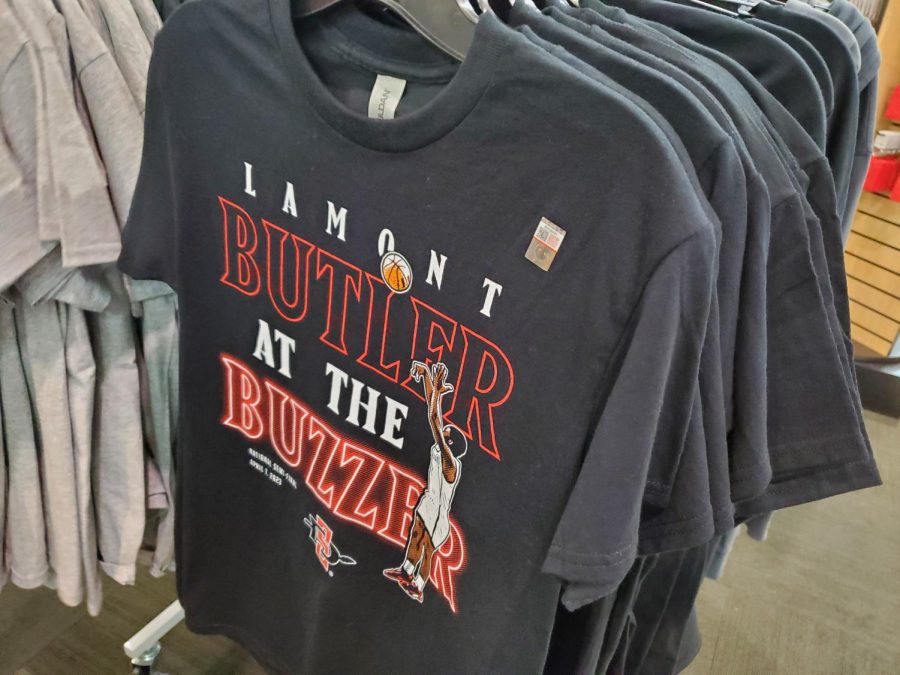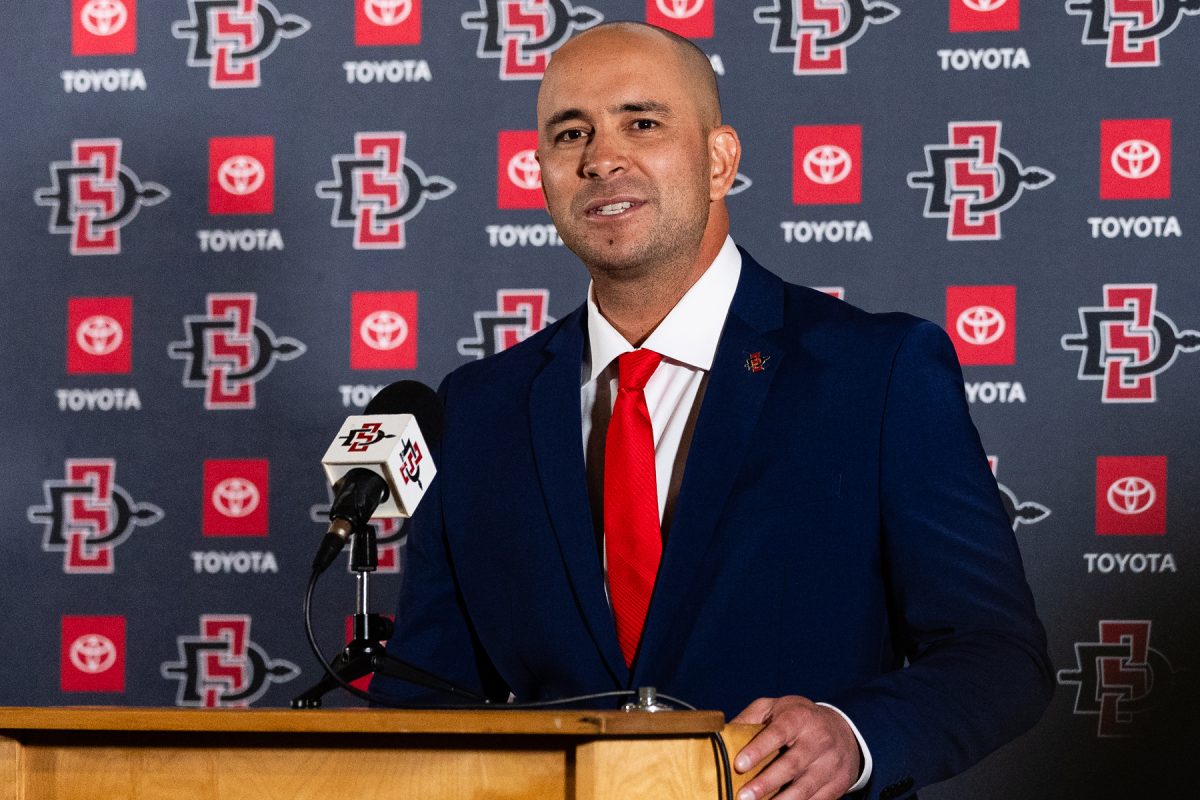It’s said you never forget your firsts; your first kiss, your first concert, your first trip to the Final Four…
2022-23 has been a year filled with them for San Diego State athletics, highlighted by the men’s basketball team’s appearance in the National Championship game as well as the opening of Snapdragon Stadium. Perhaps one of the biggest for student athletes across the department has been the rollout of platforms allowing them to capitalize on their Name, Image and Likeness (NIL).
For decades, NCAA student athletes were restricted from receiving benefits both related and unrelated to education. This was recently undone as California took the lead by passing SB 206 in 2019, and the 2021 NCAA v. Alston Supreme Court case which effectively enabled removing most of these restrictions. Shortly afterwards the NCAA issued an interim policy governing NIL.
“We wanted to embrace NIL as much as we could with the understanding that there were so many unknowns that we were going into,” Tim Lankski, SDSU Senior Associate Athletic Director of Compliance, said. “Our number one approach to this from an intentional standpoint was let’s get some education, let’s get some programming.”
San Diego State became the first Group of Five school to fill an NIL Coordinator position when it hired Michelle Meyer in November 2021. The Aztec Advantage program launched under her direction with the goals of educating, empowering and protecting student athletes as they seek out NIL opportunities.
“It really almost turned into a business consulting role with the student athletes,” said Meyer, who currently works at NIL Network, which she founded in 2020. “We would sit down, look at their platforms, how they wanted to take advantage of these opportunities and build that strategy.”
Aztec Advantage provides NIL-specific education as part of a personal development program that student athletes participate in called Aztecs Going Pro. The four-year course focuses on personal growth, career development and civic engagement.
“We spent a year and a half developing curriculum where they’re getting education every semester on NIL that we’ve spent a year and a half developing on how to build your brand,” Lanski said.
For some, brand development came as easy as capitalizing on their personality and a particularly impactful play on the field. Outgoing senior linebacker Caden McDonald knocked one of his front teeth out while tackling a quarterback during his junior year, and not long after the “Toothless Cowboy” was born.
“I’d made a TikTok that went viral and that catapulted the whole thing,” McDonald said. “The timing of everything was God sent too, it hit right after the season, and I had a whole year to be able to build my profiles up.”
Now Toothless Cowboy is an apparel line that sells everything from hats and clothing to koozies and stickers online. While some initially had a laugh about his fearlessly fun-loving online persona, McDonald said that he was able to lend his hand to teammates and his brother Cooper about how to make money as a personal brand.
Beyond individually owned brands, this season the athletic department expanded their partnerships with the launch of the SDSU NIL Store and the SDSU NIL Marketplace.
On the NIL Store, student athletes partner with Campus Ink to sell officially licensed apparel with their names on it. The SDSU NIL Marketplace is operated by OpenDorse and enables student athletes to connect with fans and companies to be compensated for everything from social media posts and videos to autographs and event bookings.
“Those are the two where we put emphasis in terms of platforms for our student athletes to take advantage of because it’s open to everybody,” Lanski said. “It’s equitable, whoever wants to do it can do it and can be successful.”
Senior cross country and track team runner Jessica Kain has been able to leverage her followings on Instagram and Snapchat via OpenDorse. It’s enabled her to both partner with brands and products she supports, while also serving as a role model within the running community.
“I would say 50-50 for the ones that I apply for and I actually get all are paid, which is really nice and that’s paid right through the app,” Kain said.
“I show everyone a day in the life…For the running community and for younger girls who are in high school or elementary school who maybe see that, I can show them what it’s like to be a college athlete.”
Lanski sees these examples of students working as entrepreneurs, selling themselves as a spokesperson or helping impart how to develop athletic skills in coaching roles at sports camps or clinics as “the real purpose of why people have been craving NIL.”
It also helps to lessen financial concerns for the student athletes.
“Being an athlete, we don’t have time for a job,” McDonald said. “To work with another company is a blessing, it makes you feel great knowing that they trust you and want to invest in you on and off the field.”
Another avenue has been signing deals to appear on apparel created and sold by outside companies. The Sons of Montezuma blog touts themselves as the first San Diego-based business to support student athletes by licensing their NIL for use on shirts with player-specific slogans and images.
“I had plans and was already designing and laying out the website and our online store,” Sons of Montezuma Founder and Content Director Matt Ortiz said. “As soon as that ruling came down, it was within hours that I saw Greg Bell’s tweet and I connected with him on social media.”
Bell, a senior running back and the leading rusher on the 2021 football team that went 12-2 and won the Frisco Bowl, was a perfect fit for a student athlete that Ortiz wanted to support. Not only was Bell a top performer, but as a born-San Diegan who attended Bonita Vista High he had the hometown ties that Ortiz wanted to highlight.
“If you make an investment in these student athletes, you really are making an investment in San Diego…It really is an investment in the community because of the visibility, the personalities and the character of these young people,” Ortiz said. “There aren’t many people in San Diego that aren’t touched or affected by SDSU in some way.”
Beyond selling apparel, community members have created organizations that engage with certain teams. The non-profit MESA Foundation is an example of this, which compensates members of the basketball programs to partner with causes and charities in the San Diego area.
As the prominence of the Aztecs athletics program continues to rise, the athletic department has aimed to have an NIL program that is scalable with that growth. Beyond the expected announcement of a new NIL coordinator within the coming weeks, Lanski said that there is focus on getting more involvement with the local business community.
The run to the Men’s Basketball National Championship game also showed the program’s reach in a local sports market where the San Diego Padres are the largest presence.
“There are 85,000 local businesses here in San Diego without a lot of competition for sports sponsorship dollars, so I think the opportunity is really big,” Meyer said. “It’s just gonna take time for them to understand all of the pieces and why they would engage in this space.”
Beyond supporting the athletics program as a whole, it makes a major difference for student athletes in every sport.
“If you’re not on a full ride or anything, you’re still paying for rent and you’re still paying for school, it’s extremely expensive,” Kain said. “It’s really cool because I can create this brand image of myself and kind of give back to the running community, give back to people who haven’t hit college yet or haven’t gone into this whole crazy competitive sport.”
The 2022-23 San Diego State sports year has been memorable for many reasons, and as opportunities continue to grow for student athletes and the athletics department, there is plenty of anticipation for more firsts.
“We’re excited for what the future holds for us, we’re confident that San Diego is going to rally around and continue to support and lift San Diego State to be the best,” Lanski said.








